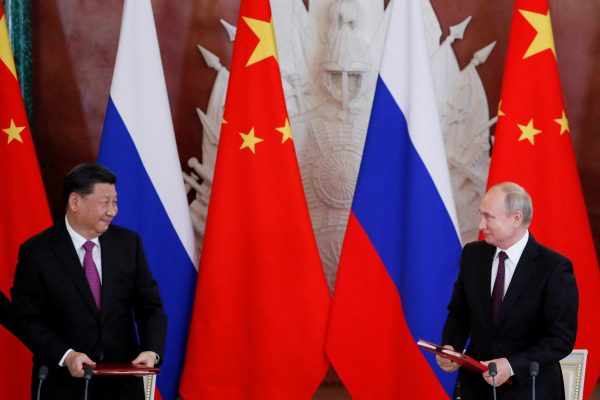To some, Chinese President Xi Jinping made his choice when he issued a communique for reordering the international order with Putin on 4 February 2022 at the outset of the Beijing Olympics. Both leaders pronounced that the China-Russia relationship knows ‘no boundaries’. Many US analysts assume Putin used the meeting to secure Xi’s support for his plans in Ukraine, and that China and Russia must be treated as common enemies in an ideological contest between democracy and authoritarianism.
There is coherence to this line of thinking and Beijing may validate such analysis through its own actions and choices over time. But it would be premature to automatically default to such a conclusion. Blind acceptance of the impotence of the United States or its partners to influence China’s pursuit of its interests represents a failure of imagination and an abandonment of diplomacy. Successful statecraft entails opening pathways for dealing with problems, not pre-emptively closing them.
There have been calls in Washington policy circles to highlight the closeness of the China–Russia partnership to make Beijing pay a reputational price for its support for Moscow. This is the diplomatic equivalent of arm-waving at an impending train wreck.
The approach is built upon two questionable assumptions. The first is that China could be shamed into splitting with Russia. If shame was a driving factor in Beijing’s strategic calculus, China would be responsive to criticism over its gross human rights violations in Xinjiang and would adjust its actions in the South China Sea. In both cases, Xi doubled down. The second assumption is that nothing can alter Beijing’s thinking on Russia and that the objective should be to make China pay as high of a reputational price as possible.
Rather than succumbing to such fatalism, now is the time for US diplomats to test whether Beijing’s approach to Russia is set in stone. It is a time to probe whether Beijing believes its interests would be advanced by driving the world into rival blocs, where China is aligned with Russia while the United States deepens its partnerships with the rest of the developed world.
An objective of drawing the Chinese into a discussion about their future strategic orientation would be to push Beijing to take concrete actions to establish some daylight between Russia’s aggression and China’s interests. Beijing needs to confront the reality that it faces a shrinking window to demonstrate that China is guided by its own interests and does not view itself as Moscow’s proxy.
China’s alignment with Russia will be tested in the coming weeks, but it may be reluctant to arrive at independent decisions on these issues given the recency of Xi’s embrace of Putin in Beijing. This is where there is a role for quiet diplomacy.
The director of the US Central Intelligence Agency, Bill Burns, would be an ideal candidate to lead such efforts. Given his depth of knowledge on Russia and the high esteem in which he is held in Beijing, his views would be taken seriously by Chinese interlocutors. Delaware Senator Chris Coons could also play a unique role in probing China’s strategic thinking given his foreign policy expertise and close relationship with US President Joe Biden.
Senator Coons could conceivably draw National People’s Congress Chair Li Zhanshu to serve as his legislative counterpart. Li is among a small handful of people in China authentically close to Xi Jinping and is familiar with the China–Russia relationship, given his previous experience as Xi’s special envoy to Moscow.
State Department officials would be able to test Chinese thinking without attracting intense media scrutiny. After discussions have ripened, it would also be important for Biden to speak directly with Xi to take his measure of China’s future direction. Given heightened tensions between the United States and China, Washington also would be wise to enlist other parties in probing China’s leaders on their strategic thinking.
Efforts to stimulate Beijing about the long-term consequences of its decisions may prove to be for naught. Beijing could decide that it is arrayed against a hostile West bent on blocking China’s rise and that its only recourse is to remain in lockstep with Moscow, consequences be damned. If I were an oddsmaker, I would rank this as the most likely scenario.
At the same time, China and Russia do not have perfectly aligned interests. China has a lot more to lose than Russia. Putin is essentially an arsonist of the international system presiding over a country in terminal decline. Xi sees himself as a renovator of the international system to make it more accommodating of China’s vision and its values. China views itself as a country on the rise. Beijing’s interests are ill-served when the United States and the European Union view China and Russia as interchangeable foes.
For Beijing, gradually reorienting from Russia need not mean moving closer to the West. It would simply mean that Beijing continues to be guided by its own interests, rather than entrenched commitments with Moscow. Any progress along these lines would not yield any signing ceremonies or headline-worthy pronouncements out of Beijing. It would not ameliorate profound US concerns over China’s conduct at home and its assertiveness abroad. But in the world of diplomacy, actions by Beijing to gradually distance itself from Moscow would count as progress.
Ryan Hass is a senior fellow and the Michael H Armacost Chair and the Chen-Fu and Cecilia Yen Koo Chair in the Foreign Policy program at the Brookings Institution.
A longer version of this article was originally published at Brookings.

